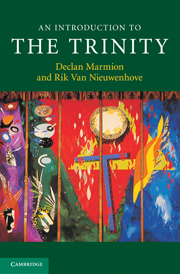Book contents
- Frontmatter
- Contents
- Abbreviations
- Acknowledgements
- 1 Introducing trinitarian theology
- 2 The Trinity and its scriptural roots
- 3 The doctrine of the Trinity: its emergence and development in the life of the Christian community
- 4 Theology of the Trinity from Richard of St Victor to the Reformation
- 5 The Trinity from Schleiermacher to the end of the twentieth century
- 6 Contemporary trinitarian theology: problems and perspectives
- Epilogue
- Index
- References
1 - Introducing trinitarian theology
Published online by Cambridge University Press: 05 August 2012
- Frontmatter
- Contents
- Abbreviations
- Acknowledgements
- 1 Introducing trinitarian theology
- 2 The Trinity and its scriptural roots
- 3 The doctrine of the Trinity: its emergence and development in the life of the Christian community
- 4 Theology of the Trinity from Richard of St Victor to the Reformation
- 5 The Trinity from Schleiermacher to the end of the twentieth century
- 6 Contemporary trinitarian theology: problems and perspectives
- Epilogue
- Index
- References
Summary
Much current writing on the Trinity refers to a renaissance of trinitarian theology. Certainly the last two decades have seen a surge in publications on the Trinity – incorporating historical, contemporary, and interdisciplinary perspectives. It is as if theologians want to compensate for a legacy of marginalisation, particularly of pneumatology, within theology. Not that theology was ever entirely unaware of its trinitarian foundations and structure. But this framework remained to a large extent implicit, rather than explicit. The generalised and somewhat caricatured description of this state of affairs is that the doctrine of the Trinity developed in an abstract and speculative direction. It was preoccupied with talk about the inner life of God (the immanent or eternal Trinity) to the neglect of God as revealed in the biblical narratives of salvation history (the economic Trinity).
While this might describe how the Trinity was taught in seminaries with the tracts De Deo Uno followed by De Deo Trino, and its trinitarian axioms, it does not do justice to the theological giants who transcend easy categorisation. Thus those who accuse Augustine of a basically introspective trinitarian theology – focussing on psychological analogies to explicate the trinitarian life – overlook that, in the first part of his De Trinitate, Augustine searches, admittedly rather imaginatively, for trinitarian analogies in Scripture. Even Thomas Aquinas, at whose door many of the problems with an abstract and intellectualist approach to theology have been put, evinces an impressive integration of theology and spirituality, even though this is not immediately apparent in his Summa Theologiae.
Information
- Type
- Chapter
- Information
- An Introduction to the Trinity , pp. 1 - 28Publisher: Cambridge University PressPrint publication year: 2010
